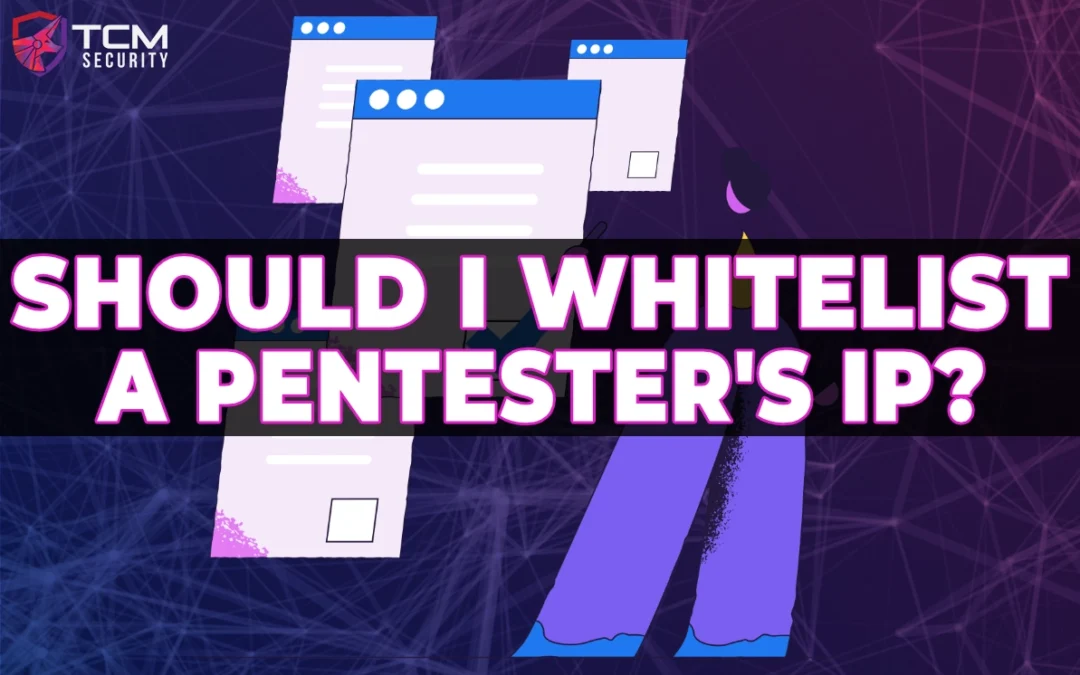While working out the details with a client for an upcoming security assessment, whitelisting the penetration testers IP addresses always generates additional conversation. It may seem odd because you wouldn’t whitelist your adversaries to bypass a security control, so why would you do it during an attack simulation. Depending on your resources, needs, and what you hope to accomplish whitelisting may not be the best fit, so let’s see what our options are.
Whitelisting
What do we mean by whitelisting in this context? It’s allowing an exception through your security control, which often times will be a firewall or some type of IPS (intrusion prevention system). This could vary depending on the assessment you are having conducted for instance in application testing you may want to whitelist in the WAF (web application firewall). Essentially it is allowing traffic or some interaction that normally you wouldn’t allow.

Benefits
1) Cost
The most common reason for doing this is it reduces the amount of time spent on an engagement which thusly reduces cost. If the penetration tester can immediately begin testing an asset without having to take the time to bypass detective/preventive controls, more value-add testing will be conducted in a shorter period. Often engagements are sold based on an allotment of time versus goal achievement and it may not be beneficial to test the firewall more than the application itself.
2) Diligence
As the saying goes, an attacker only has to be right once, but the defender has to be right every time. Most attackers are looking for the easiest way to achieve their goal, while security testing by nature is to measure risk holistically. A penetration tester may find an easy way in, but the work doesn’t stop there, he/she has start over from the beginning and look for new avenues. Noisy tools such as vulnerability scanning are utilized, which is quite noisy and often detected by defensive security products, to speed the process up and provide a much thorough view of the attack surface.
3) Time Limitations
As mentioned earlier, whitelisting allows for a much faster engagement. Bypassing security products is often a manual process which takes time and may eat up the majority of an engagements time-limited scope. The tester may not be able to bypass the control in the allotted time which would give the client a false sense of security because attackers have unlimited amounts of time. If an attacker is able to bypass a control, they could have the ability to conduct an attack that the tester would have easily found had they been whitelisted but were toying with the IPS.

Alternative Approaches
We’ve discussed the benefits of whitelisting a penetration tester’s IP address, but you do have some additional options if you aren’t totally convinced.
Detect Only
Penetration testing organizations typically ask that you still detect malicious activity to better provide a measurement for your detection capabilities and it’s no different in terms of whitelisting. Traditionally, the best solution is to detect the malicious activity but not block it for penetration testers IP address. This will give you a more complete view of your detective abilities and reduce the cost of an assessment.
Change Security Levels
An option that we see some clients choose is to whitelist for only part of the engagement. This is typically done towards the end of the engagement if there is additional time or set at a specific date or point in the engagement. This option is great if conduct engagements regularly and see there is often time left over or want to further mature your security program.
Assessment Separation
If you’ve recently purchased a new IPS and want to test out its capabilities, then starting a separate assessment that’s dedicated to the IPS and evasion techniques may be an effective solution. In this scenario you would have 2 engagements, 1 where you whitelist and test an asset and 1 where the IPS itself is tested.
Block Anyways
Of course, you always could block the penetration testers IP address anyways and thusly would turn your testing into more of a red team engagement. These engagements are traditionally performed over longer periods of time, but they do simulate an organic attack as closely as possible. We highly recommend you review the scope closely and budget for the additional time required as well as only choose this option if your security program is in a mature state.

About the Author: Heath Adams
Heath Adams, also known as “The Cyber Mentor,” is the CEO of TCM Security. While Heath is an ethical hacker by trade, he also loves to teach! Heath has taught courses to over 1,000,000 students on multiple platforms, including TCM Academy, Udemy, YouTube, Twitch, and INE.
Heath has held many certifications, including CISSP, PNPT, QSA, GSNA, OSCP, ECPTX, and eWPT. He also holds an MBA degree.
Finally, Heath is also a husband, animal dad, tinkerer, and military veteran.
About TCM Security
TCM Security is a veteran-owned, cybersecurity services and education company founded in Charlotte, NC. Our services division has the mission of protecting people, sensitive data, and systems. With decades of combined experience, thousands of hours of practice, and core values from our time in service, we use our skill set to secure your environment. The TCM Security Academy is an educational platform dedicated to providing affordable, top-notch cybersecurity training to our individual students and corporate clients including both self-paced and instructor-led online courses as well as custom training solutions. We also provide several vendor-agnostic, practical hands-on certification exams to ensure proven job-ready skills to prospective employers.
Pentest Services: https://tcmdev.tcmsecurity.com/our-services/
Follow Us: Blog | LinkedIn | YouTube | Twitter | Facebook | Instagram
Contact Us: sales@tcm-sec.com

